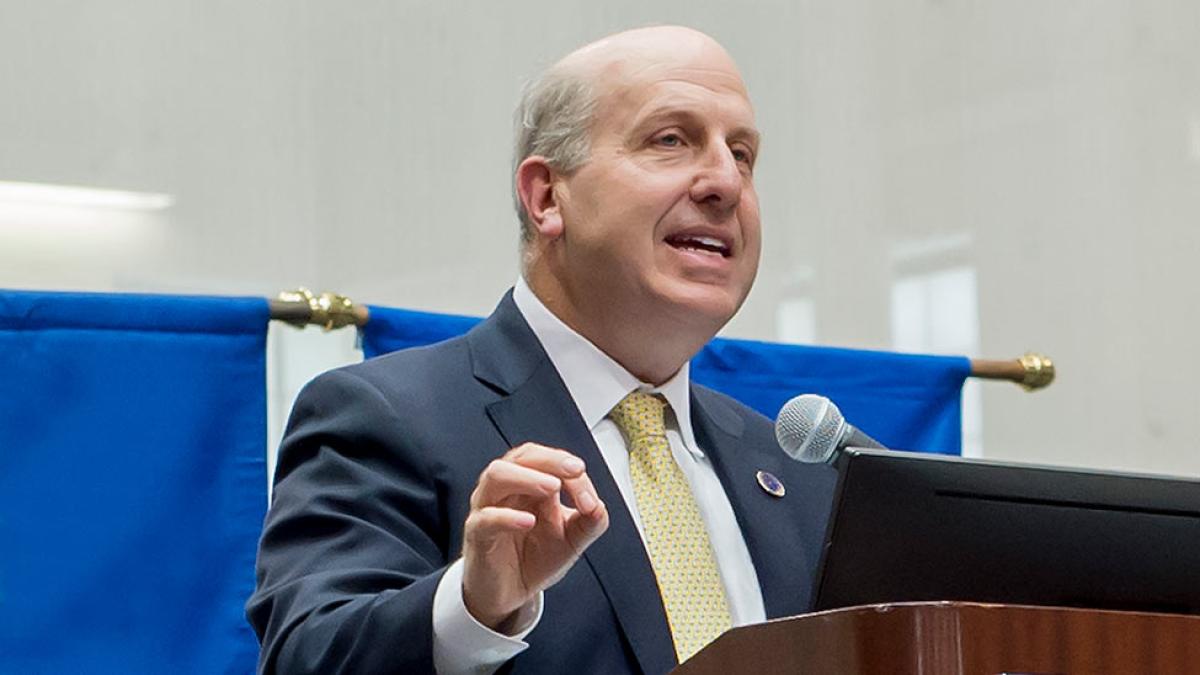
MPA vs. MPH—Which Degree Is Best for You?
MPA vs MPH: Discover the key differences to determine which degree best aligns with your career goals in public health, administration, or policy.

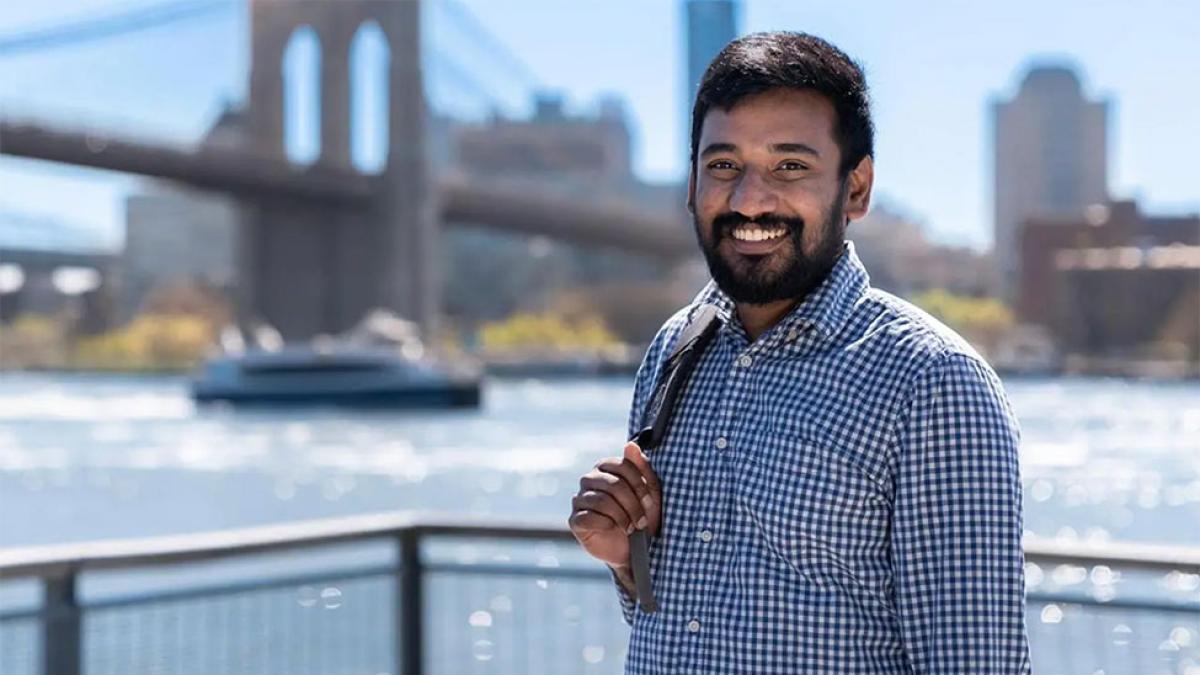
Deciding between a Master of Public Administration (MPA) and a Master of Public Health (MPH) is an important step in shaping your path toward a meaningful and impactful career. While both degrees prepare graduates for leadership roles in public service, each offers a distinct focus: A MPA develops leaders and analysts in public, and nonprofit organizations (which can be government agencies, healthcare institutions and non-profit organizations) with strong applied analytical and administrative skills to solve complex public service problems and manage public service programs, whereas a MPH equips professionals to address public health challenges through data-driven solutions in community health, disease prevention, and healthcare management.
In this guide, we’ll examine the core differences between these two degrees—including curriculum, program duration, and career outcomes—so you can determine which path best aligns with your professional goals and passion for public service.
What Is a Master of Public Administration?
A Master of Public Administration prepares professionals to lead and manage in the public and nonprofit sectors. With a curriculum rooted in public service management, operations, policy, and organizational leadership, this degree gives students the skills to develop and implement policies, manage resources and programs, and drive change within communities through evidence-driven assessment.
At Pace University, those core leadership competencies are further strengthened by a STEM designation that emphasizes advanced, data-analysis-driven social science methods, an advantage that also extends STEM OPT eligibility to international students. The program is fully accredited by the NASPAA, the global benchmark for public service education, and is ranked #121 in U.S. News & World Report’s 2025 list of Best Graduate Public Affairs Schools.
In addition to a stand-alone MPA, different types of specializations are available to tailor the degree toward specific career paths. For example, Pace University offers unique options such as a combined MPA/Juris Doctor, JD for those interested in expanding career possibilities across law, government, and public service through an accelerated dual-degree program.
- Core focus: Public administration, public policy, nonprofit management, healthcare administration
- Key topics: Financial management, organizational leadership, program evaluation
- Program length: Two years full time, with flexibility for longer part-time study
- Skills developed: Public budgeting and financial management, quantitative and qualitative data analysis, policy implementation
- Common career paths: City manager, nonprofit director, budget analyst, program director.
Ideal for those interested in public service, a MPA is considered one of the best master’s degrees for business-minded professionals who want to make a tangible impact through leadership in government, public organizations, and nonprofit sectors.
What Is a Master of Public Health?
A Master of Public Health prepares graduates to tackle health issues at community, national, and global levels. Focusing on disease prevention, health promotion, and policy advocacy, this degree equips students with the skills to analyze public health data, design impactful health programs, and implement strategies that enhance population health.
Different types of concentrations are available within MPH degrees that help tailor the program-specific career goals. Pace University offers a unique concentration in global health equity (hyperlink to program page) for those interested in pursuing careers that use public health sciences to identify, engage, and support communities who experience barriers to improved health.
- Core focus: Public health challenges, disease prevention, health promotion
- Key topics: Epidemiology, biostatistics, environmental health, health policy
- Program length: Typically two years
- Skills developed: Data analysis, public health communication, program evaluation
- Common career paths: Epidemiologist, health policy analyst, community health program manager
A public health degree provides the foundation and expertise to work in healthcare settings, government health departments, NGOs (non-governmental organizations), and the private sector making it one of the best graduate programs for those dedicated to advancing public health and community well-being in a variety of settings.
MPA vs. MPH Degree: Key Differences
While both degrees can lead to impactful careers in public service, a MPA and MPH prepare students for different types of roles and responsibilities.
Broadly speaking, a MPH is clinically oriented, meaning it is centered on how to prevent disease and improve population health, whereas a MPA is operationally oriented, or focused on how to run, finance and govern the organizations that deliver those services. Both programs teach data analysis but deploy it differently: MPH students apply epidemiological methods to track health threats and evaluate interventions, while MPA students use quantitative management tools to allocate resources, measure program performance, and shape policy.
Here, we break down the essential differences between the two programs, including education requirements, program length, areas of specialization, and average salary expectations.
| Differences between programs | MPH | MPA |
|---|---|---|
| Education Requirements | Emphasizes public health coursework, including fieldwork, internships, and a capstone project | Focuses on public management, analysis and policy development, with courses in financial management, organizational leadership and data analysis. |
| Program Duration | Typically 2 years full-time | Two years full time, with options for longer part time study |
| Specializations | Tracks available (depending on the institution) in epidemiology, global health, and health equity | Specializations in government management, nonprofit management, and healthcare administration |
| Average Salary, New York City | $88,680 (Public Health Analyst) | $103,390 (Public Policy Analyst) |
What Can You Do with a MPH?
A Master’s in Public Health opens doors to diverse roles focused on promoting health and preventing disease on a community and global scale. MPH graduates often work in healthcare, government, and nonprofit organizations, using their skills to tackle public health issues, conduct research, and design health initiatives.
Explore some of the rewarding career options available to MPH graduates:
| Career Path | Description | Average Base Annual Salary (New York City) & Job Growth Outlook (2023–2033) |
|---|---|---|
| Epidemiologist | Studies disease patterns to control and prevent public health issues | $128,488 16% |
| Public Health Advisor | Develops and implements health policies to improve public health outcomes | |
| Health Service Manager* | Manages operations in healthcare facilities to ensure efficient delivery of services | |
| Community/Public Health Program Manager* | Oversees programs that address specific health needs within communities | |
| Environmental Health Specialist | Focuses on environmental factors that impact public health, such as pollution control | 7% among Environmental Scientists and Specialists career path |
*This role overlaps with many facets of public administration and may be pursued by MPA graduates as well.
What Can You Do With a MPA?
A MPA prepares graduates for leadership roles in public administration, policy analysis, and nonprofit management. These professionals typically work in government agencies, nonprofit organizations, and policy think tanks, where they implement programs, manage resources, and influence public policy.
Consider some of the dynamic career paths open to those with a MPA:
| Career Path | Description | Average Base Annual Salary (New York City) & Job Growth Outlook (2023–2033) |
|---|---|---|
| City Manager | Oversees the operations and services of a city or municipality, ensuring effective local government | |
| Policy Analyst | Researches and evaluates public policies to recommend improvements or new strategies | |
| Nonprofit Executive Director | Leads a nonprofit organization, focusing on fundraising, program development, and strategic planning | |
| Public Affairs Director | Manages communication between organizations and the public to build awareness and influence public policy | 7% among Public Relations and Fundraising Managers career path |
| Health Services Administrator | Directs operations in healthcare facilities, often within the public sector |
MPA vs MPH: Which Degree Should You Choose?
Deciding between a MPA and a MPH ultimately depends on your career goals, interests, and preferred work environment. Both degrees offer pathways to impactful roles, but each focuses on different areas of public service.
Here’s a quick comparison to help clarify your path:
| Pathways comparison | MPH | MPA |
|---|---|---|
| Career Goals | Ideal for careers in public health, disease prevention, and healthcare management | Suited for leadership roles in public service organizations (government agencies, nonprofit organizations and healthcare institutions) |
| Work Environment | Commonly work in healthcare, public health departments, NGOs, and research institutions | Typically employed in government agencies (local, state and federal), nonprofit organizations, and healthcare institutions. |
Paving Your Path to Public Service With Pace
Both the MPA and MPH degrees offer rewarding paths in public service, each tailored to distinct professional goals. A MPH is ideal for those dedicated to improving health outcomes and addressing public health challenges, while a MPA prepares leaders to shape policy, manage resources, and drive change in government and nonprofit sectors.
If you’re ready to take the next step, explore the MPA and MPH programs at Pace University, where you’ll gain the skills, connections, and experience needed to make a meaningful impact in your field. For added convenience and flexibility, Pace offers these degrees both in-person and online. Reach out today for personalized guidance on how Pace can support your journey.
Sands College: Where You've Seen Us
Sands College of Performing Arts students learn to navigate the industry from day one. In addition to designing, choreographing, stage managing, directing, and forming theater ensembles around the world, here’s where you’ve recently seen us.


Sands College of Performing Arts students learn to navigate the industry from day one. In addition to designing, choreographing, stage managing, directing, and forming theater ensembles around the world, here’s where you’ve recently seen us.
Broadway
- & Juliet
- A Beautiful Noise, The Neil Diamond Musical
- After Midnight
- Ain’t Too Proud
- Aladdin
- Almost Famous
- American Psycho
- Appropriate
- Back to the Future The Musical
- Bad Cinderella
- Be More Chill
- The Book of Mormon
- Bridges of Madison County
- Bring It On
- Broadway
- Bye Bye Birdie
- Cabaret
- Caroline, Or Change
- Carousel
- Cats
- Charlie and the Chocolate Factory
- Christmas Spectacular Starring the Radio City Rockettes
- Cirque du Soleil’s Paramour
- Dear Evan Hansen
- Diana
- Disney’s Frozen on Broadway
- Escape to Margaritaville
- The Ferryman
- Floyd Collins
- Gettin’ the Band Back Together
- Grey House
- Hadestown
- Hair
- Hamilton
- Harry Potter and the Cursed Child
- Head Over Heels
- The Heart of Rock and Roll
- Hell’s Kitchen
- Hello, Dolly!
- Here Lies Love
- The Hills of California
- How To Dance In Ohio
- Ink
- Jagged Little Pill
- Kimberly Akimbo
- Merrily We Roll Along
- Miss Saigon
- MJ The Musical
- Motown the Musical
- Moulin Rouge! The Musical
- Mrs. Doubtfire
- Natasha, Pierre & the Great Comet of 1812
- Newsies
- The Notebook
- On the Town
- Once On This Island
- Once Upon a One More Time
- Operation Mincemeat
- The Outsiders
- Parade
- Pirates of Penzance
- Pretty Woman
- The Prom
- Shuffle Along
- Six: The Musical
- Some Like It Hot
- Spider-Man: Turn Off the Dark
- Stereophonic
- Suffs
- Sunset Boulevard
- Sweeney Todd: The Demon Barber of Fleet Street
- Swept Away
- The Tina Turner Musical
- The Who’s Tommy
- Waitress
- West Side Story
- Wicked
Selected TV
- 9-1-1 (ABC)
- 9-1-1: Lone Star (Fox)
- The Americans (FX)
- Big Sky (ABC)
- The Blacklist (NBC)
- Blue Bloods (CBS)
- Boardwalk Empire (HBO)
- Brilliant Minds (NBC)
- Bull (CBS)
- Chicago Fire (NBC)
- Chicago Justice (NBC)
- Cocaine Sisters (Urbanflix TV)
- Combat Hospital (ABC)
- Criminal Minds (CBS)
- Daisy Jones & The Six (Amazon Prime)
- Deadbeat (Hulu)
- The Deuce (HBO)
- Dexter: New Blood (Showtime)
- Difficult People (Hulu)
- El Colapso (Vix+)
- Genius (Hulu)
- The Get Down (Netflix)
- The Good Fight (CBS)
- Gossip Girl (MAX)
- Gotham (FOX)
- Grease LIVE (Fox)
- Hawaii Five-0 (CBS)
- Homeland (Showtime)
- Instinct (CBS)
- The Knick (Cinemax)
- The Last Days of Ptolemy Grey (Amazon Prime)
- Law & Order: SVU (NBC)
- Less Than Zero (Hulu)
- Madam Secretary (CBS)
- Mildred Pierce (HBO)
- Modern Love (Amazon Prime)
- Monsters: The Lyle and Erik Menendez Story (Netflix)
- Mr. Robot (USA)
- Mrs. Davis (Peacock)
- Murder in the First (TNT)
- The Mysteries of Laura (NBC)
- NOS4A2 (AMC)
- Orange Is the New Black (Netflix)
- The Path (Hulu)
- The Pitt (HBO Max)
- Pose (FX)
- Queer as Folk (Peacock)
- Royal Pains (USA)
- Sangre llama Sangre (Claro-Video)
- Saturday Night Live (NBC)
- Sex & Drugs & Rock & Roll (FX)
- Shameless (Showtime)
- Show Me a Hero (HBO)
- Star Trek: Strange New Worlds (Paramount+)
- Swarm (Amazon Prime)
- The Marvelous Mrs. Maisel (Amazon Prime)
- The Mayor (ABC)
- The Summer I Turned Pretty (Amazon Prime)
- The Voice (NBC)
- The Waterfront (Netflix)
- Unbreakable Kimmy Schmidt (Netflix)
- Y: The Last Man (FX)
- Younger (TV Land)
Selected Film
- 109 Billion Followers
- Adam
- Afraid
- Black Panther
- Doors Closing
- Fire Island
- The Giant
- The Hate U Give
- Honor Student
- IF
- The Immigrant
- Judas and the Black Messiah
- Life Itself
- Love is Love (short)
- Mapplethorpe
- The Matrix Resurrections
- Mean Girls (2024)
- Miller & Son
- Moonrise Kingdom
- My Friend Dahmer
- Night Comes On
- Rebel in the Rye
- Ruta Vita
- Satanic Panic
- Spirited Away
- Step Back
- The Subject
- Superman (2025)
- Swallowed
- Tangerine
- They/Them
- Transformers: Rise of the Beasts
- West Side Story
- You Can’t Run Forever
Bringing Stories to Life at The New York Times: Q+A with Alexis Winston '17
Film and Screen Studies alumna Alexis Winston is living her dream, turning her passion for creating meaningful video content into a reality at The New York Times.
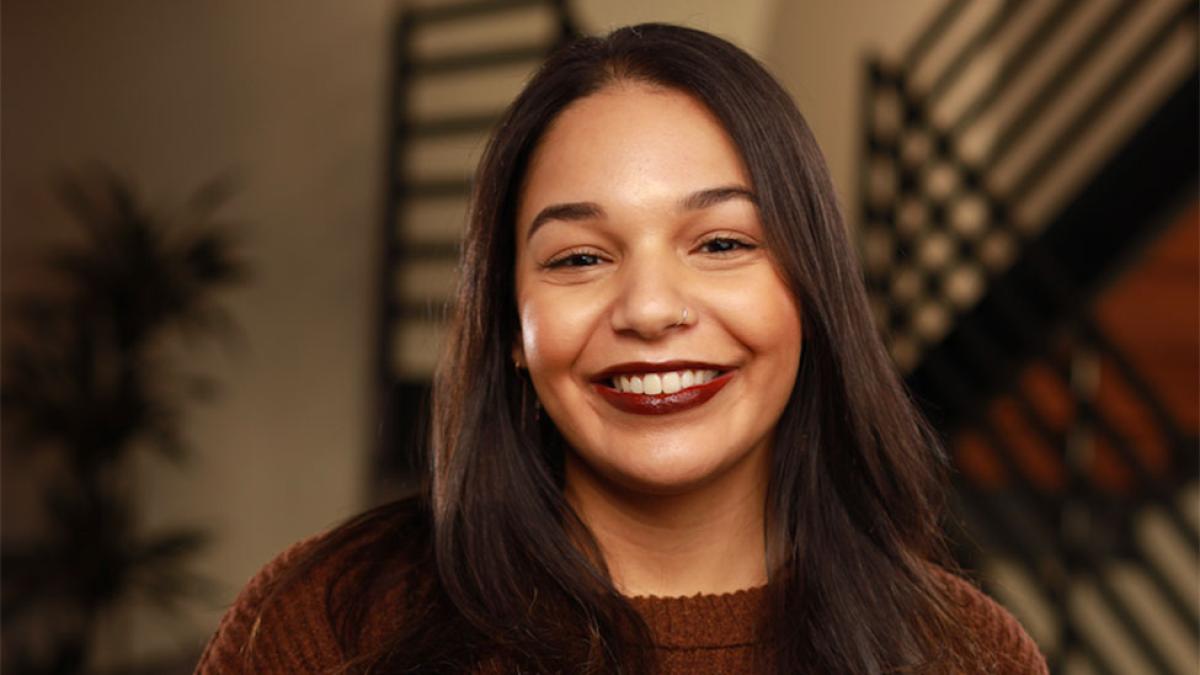

Alexis Winston
Class of 2017
BA in Film and Screen Studies
You have recently joined The New York Times as a video production and planning coordinator. Please tell us more about this role and how this work has been meaningful to you.
This is a brand-new role on the reporter video team, where I serve as a conduit between producers, journalists, and the operations team to execute high-quality video content that supports some of the most renowned reporters in the world. It’s deeply meaningful work, to contribute to one of the most respected news organizations on the planet, where our goal every day is to serve the public with accurate, thoughtful, and engaging journalism. Helping to bring that mission to life through video feels both purposeful and humbling.
What has your career trajectory been like since graduation from Pace?
My career trajectory has been perfectly imperfect. I spent about eight years freelancing in film, working my way from a production assistant to a production coordinator, and steering toward assistant directing. Landing a production assistant position at Paramount, however, changed everything; it opened the door to the corporate side of production, and I absolutely loved it. It was the perfect blend of office operations and 12-hour set days, a balance I didn’t know was possible. Like many in the industry, I faced periods of unemployment during the aftershocks of COVID and the SAG-AFTRA and Writers Guild strikes. But eventually, I found my way to Condé Nast and, later, The New York Times.
Why did you choose to pursue a BA in Film and Screen Studies?
My love for movies began when I watched Mississippi Burning at just three years old, from beginning to end. From there, it grew through family movie nights at the Regal Theater in Peekskill and later in my high school’s film club, which happened to host the largest high school film festival in the country. Choosing film as a major was an easy decision. I wanted to study in the heart of New York City, where the streets themselves feel like a film set. I’m grateful to my parents for supporting my dream, because I can’t imagine having chosen any other path.
I chose Pace because of what the university stands for: ambition, inclusivity, and real-world experience. It always felt like the place where hard work met opportunity, and it truly was.
Why did you choose to attend Pace?
I chose Pace not just because of the scholarship opportunities I received, but because of what the university stands for: ambition, inclusivity, and real-world experience. Pace always felt like the place where hard work met opportunity, and it truly was. I saw that through my friends and classmates, who constantly inspired me to push myself. With the concrete jungle as our campus, I naturally adopted the hustle mentality that New York City demands. That drive stayed with me and became the foundation for how I approach my career today.
How had your Film and Screen studies major at Pace prepared you for your career?
Pace was where I learned to take my dreams seriously. It was the first time that working in film felt tangible, something I could actually pursue. I used every opportunity, even in non-film classes, to create video projects instead of essays, and I collaborated with some of the incredible acting students to help bring those projects to life. Through Pace, I learned how to think creatively, work collaboratively, and turn my passion into a profession.
How have Dyson or Pace faculty been instrumental in your journey?
Professor Amy Zilliax of the Film and Screen Studies department is and was one of the most inspiring professors I’ve ever had. She helped me connect film to the larger human experience, reminding us that every frame tells a story about life itself. Her classes didn’t just teach film; they taught perspective, empathy, and curiosity. Her passion fueled mine and I am beyond grateful to have been taught by her.
College is a significant time in a person’s life. In what ways has your time as a Dyson and Pace student influenced you to become the person you are today?
New York has seen me through every version of myself. As a Pace student, I learned resilience–how to survive and thrive in a city that never stops moving. There were moments of loneliness, failure, and uncertainty, but Pace gave me the strength to keep going.
What advice would you give to our students, as they navigate their college life?
To current students, I’d say this: your time will come. Don’t rush it, don’t compare your journey to anyone else’s, and never give up. Keep showing up for yourself, even when the results don’t come right away. That’s where the magic happens.
What Can You Do with a Master’s in Health Informatics? Top 10 Career Options
Discover health informatics careers, explore paths and salaries, and learn how Pace’s online MS in Health Informatics can launch your future.


What is Health Informatics?
Health informatics is where healthcare meets technology. It’s the science of using data to deliver better care, streamline systems, and support life-saving decisions. The professionals who work in this field are problem solvers and innovators, who play a crucial role in the quality of care patients receive from hospitals, doctors’ offices, and even insurance companies.
At its core, health informatics focuses on how we collect, digitize, store, and share health information. From electronic patient records to secure hospital networks, this field makes sure the right data gets to the right people at the right time, whether that’s a doctor at the bedside or a researcher tracking public health trends.
It’s a fast-moving, interdisciplinary field that blends information technology, communication, and clinical knowledge. Health informatics professionals work closely with physicians, nurses, specialists, and IT teams to make care more connected.
General responsibilities for health informatics professionals include:
- Managing health information data and ensuring its quality, accuracy, accessibility, and security
- Analyzing data to improve decision-making, outcomes, and delivery while also reducing costs
- Developing, implementing, or improving electronic health records systems
- Training employees in different software and implementing processes that streamline reporting
- Ensuring organizations follow regulations at the federal and state levels
Why Pursue a Career in Health Informatics?
As hospitals, clinics, and public health systems rely more heavily on digital tools, they need professionals who can make technology work for patients and the larger healthcare system.
They make sure electronic health records are accessible, accurate, and secure. They help doctors and nurses deliver faster, smarter care. They analyze trends, reduce costs, and drive decisions that improve patient outcomes across entire populations.
And according to the U.S. Department of Labor Statistics, the field shows incredible promise.
Employment for computer and information systems managers is projected to grow 15% from 2024 to 2034, much faster than the national average of 4% across occupations. Overall employment in healthcare occupations is also expected to grow rapidly, driven by aging populations, expanding data use, and an increased focus on value-based care.
In other words, the industry is scaling quickly, with plenty of opportunities for those who want to pursue it. Whether you’d like to work in a hospital, a public health agency, a private tech company, or a research institution, health informatics gives you the tools to lead meaningful change.
Do you need experience in healthcare or information technology to start?
Health informatics is a career path that can be achieved with many different starting points.
Some professionals begin with a clinical background, such as nursing, pharmacy, or allied health, and build technical skills along the way. Others come from the tech world, then add medical knowledge to understand how their work impacts patient care.
What matters most is the ability to connect the dots between how health systems function, how technology supports them, and how to deliver smart, scalable solutions that improve outcomes.
Whether you're switching careers or upskilling, a degree in health informatics equips you with the tools you need to step into a high-impact role.
If you're wondering where your current skills stack up, here are the essentials of a trained health informaticist.
- Knowledge of health data systems
Understand how electronic health records (EHRs), patient portals, and clinical databases work behind the scenes. This foundation lets you navigate complex systems and ensures patient data flows smoothly and securely. - Programming know-how
Get comfortable with languages like SQL, Python, or R. These tools help you extract, manage, and analyze data efficiently, turning raw information into actionable insights. - Data analytics skills
Learn to interpret trends and visualize insights that support smart, evidence-based decisions. Data-driven thinking is the key to improving patient outcomes and streamlining care delivery. - Independent problem-solving
Health informatics isn’t always straightforward. Be ready to think on your feet, troubleshoot challenges, and find creative solutions in fast-paced, high-stakes environments. - Communication and collaboration
Work across teams, departments, and specialties to keep care connected. Healthcare is a team sport that involves collaboration across departments to keep everyone aligned and focused on delivering better care.
Top Careers in Health Informatics
Specific qualifications and salaries vary by location and employer. The information below is compiled from multiple sources, including Glassdoor and the U.S. Bureau of Labor Statistics and is for the New York Metro area.
Clinical Informatics Analyst
Role: Clinical informatics analysts collect and interpret data from clinical systems to improve patient outcomes, optimize workflows, and support decision-making across departments.
Qualifications: Most positions require a bachelor’s degree in health informatics, information systems, or a related field. Many analysts also have experience in clinical settings or IT, plus strong skills in data analysis, EHR systems, and healthcare regulations.
Median Annual Salary: $141,000
Work Environment(s): Hospitals, health systems, research institutions, insurance companies, and public health agencies
Compliance Officer
Role: Compliance officers make sure healthcare organizations follow the rules. They oversee policies, monitor practices, and ensure everything from patient privacy to billing procedures aligns with federal and state regulations.
Qualifications: A bachelor’s degree in health administration, business, or a related field is required in most instances, though many professionals hold advanced degrees or certifications such as Certified in Healthcare Compliance (CHC). Strong knowledge of HIPAA and other regulatory standards is important.
Median Annual Salary: $148,000
Work Environment(s): Hospitals, clinics, insurance companies, government agencies, and large health systems
Data Scientist
Role: Data scientists turn complex data into actionable insights that improve operations across the board. In healthcare, they build models, run predictive analytics, and help organizations make smarter, faster decisions, whether it’s improving patient outcomes or optimizing operations.
Qualifications: A bachelor’s degree in computer science, statistics, math, or a related field is the baseline, however, most roles prefer a master’s or Ph.D. Proficiency in Python, R, SQL, and machine learning is essential, plus strong skills in data visualization and communication.
Median Annual Salary: $162,000
Work Environment(s): Hospitals, research institutions, public health agencies, biotech firms, insurance companies, and health tech startups
Data Analyst
Role: Data analysts gather, clean, and interpret data to help healthcare organizations solve problems and make informed decisions. They create reports, identify trends, and support every aspect of operations.
Qualifications: Most roles require a bachelor’s degree in data analytics, health informatics, statistics, or a related field. Strong skills in Excel, SQL, and data visualization tools like Tableau or Power BI are a must.
Median Annual Salary: $96,000
Work Environment(s): Hospitals, clinics, insurance companies, public health departments, and health tech firms
Director of Clinical Informatics
Role: The director of clinical informatics leads the strategy, development, and optimization of clinical information systems. They align technology with patient care, ensuring tools like EHRs support providers and meet organizational goals.
Qualifications: Typically requires a clinical degree, such as RN, NP, or MD, plus advanced education in health informatics, health administration, or IT. Strong leadership experience and deep knowledge of clinical workflows, data systems, and health regulations are essential.
Median Annual Salary: $174,000
Work Environment(s): Hospitals, large health systems, academic medical centers, and government agencies
Health Data/Information Technology Project Manager
Role: Health data and IT project managers lead projects that involve the collection, management, and use of health data. They coordinate teams, timelines, and tech tools to ensure projects stay on track.
Qualifications: The position often requires a bachelor’s degree in health informatics, IT, health administration, or a related field. Project management certifications (like PMP) and experience with tools like Jira, Trello, or Microsoft Project are highly valued.
Median Annual Salary: $136,000
Work Environment(s): Hospitals, health systems, insurance companies, government agencies, and health tech companies
Health Information System Application Designer
Role: These professionals design and build user-friendly and efficient software tools that power modern healthcare, including EHR platforms, patient portals, and clinical decision support systems.
Qualifications: A minimum of a bachelor’s degree in computer science, software engineering, or health informatics is required. Experience in user interface and user experience, front-end and back-end development, and healthcare data standards is necessary.
Median Annual Salary: $97,000
Work Environment(s): Health tech companies, hospitals, research institutions, insurance providers, and government agencies
Nursing Informatics Manager
Role: This type of manager leads the planning and implementation of technology that supports nursing practice. They manage teams, constantly improve clinical workflows, and ensure that EHRs and other systems align with the needs of nurses and patients alike.
Qualifications: Requires an active RN license and a BSN; many employers prefer a master’s in nursing informatics, health informatics, or health administration. Strong clinical experience and knowledge of health IT systems are key.
Median Annual Salary: $159,000
Work Environment(s): Hospitals, large health systems, academic medical centers, and public health organizations
Quantitative Analyst
Role: Quantitative analysts use math, statistics, and data modeling to solve complex healthcare problems. They build predictive models and help organizations make data-driven decisions that improve outcomes before issues actually arise.
Qualifications: Most roles require a bachelor’s or master’s degree in mathematics, statistics, data science, economics, or a related field. Strong skills in programming and advanced analytics are essential.
Median Annual Salary: $206,000
Work Environment(s): Health systems, insurance companies, government agencies, research institutions, and health tech firms
Clinical Data Analyst
Role: Clinical data analysts use healthcare data to identify trends, improve patient outcomes, and support clinical decisions. They play a key role in ensuring data is accurate, relevant, and actionable across departments.
Qualifications: Most roles require a bachelor’s degree in health informatics, statistics, or a healthcare-related field. Experience with EHR systems, data mining, and clinical workflows is highly valued.
Median Annual Salary: $101,000
Work Environment(s): Hospitals, clinics, research organizations, insurance companies, and health systems
Population Health Data Analyst
Role: Population data analysts focus on large-scale health trends, helping healthcare systems and public health agencies track outcomes, manage chronic diseases, and address disparities in care.
Qualifications: A bachelor’s degree in public health, statistics, or health informatics is typically required; some roles may prefer a master’s. Strong data analysis skills, knowledge of epidemiology, and experience with public health datasets are key.
Median Annual Salary: $104,000
Work Environment(s): Public health departments, research institutions, government agencies, and large healthcare systems
Senior Data Lead
Role: Senior data leads oversee data strategy, architecture, and analytics initiatives across organizations. They lead teams of analysts and data scientists to ensure insights drive business and clinical improvements.
Qualifications: Requires a bachelor’s or master’s degree in data science, informatics, or a related field. Extensive experience in data governance, modeling, and team leadership is critical.
Median Annual Salary: $173,000
Work Environment(s): Large hospitals, health tech companies, insurance providers, and consulting firms
Senior Data Lead, Solution Design
Role: This role focuses on designing high-level data solutions that meet clinical and operational needs. Senior data leads in solution design work closely with IT, clinical staff, and business stakeholders to translate complex requirements into scalable systems.
Qualifications: Typically requires a bachelor’s or master’s in computer science, health informatics, or a related field, along with experience in systems architecture, data strategy, and cross-functional collaboration.
Median Annual Salary: $262,000
Work Environment(s): Health systems, enterprise healthcare providers, EHR vendors, and health tech consultancies
IT Manager, Healthcare
Role: IT managers in healthcare oversee the implementation, security, and maintenance of information systems. They lead IT teams, manage system upgrades, and ensure technology supports clinical and operational goals.
Qualifications: A bachelor’s degree in IT, health informatics, or a related field is required; many have certifications such as CompTIA, Cisco, or PMP. Strong leadership skills and healthcare IT experience are essential.
Median Annual Salary: $137,000
Work Environment(s): Hospitals, clinics, insurance companies, and health tech organizations
Chief Medical Information Officer (CMIO)
Role: CMIOs connect clinical care with health technology. They lead the design and use of systems like electronic health records, making sure tech supports better outcomes, faster workflows, and smarter decisions across the organization.
Qualifications: Most CMIOs are licensed physicians (M.D. or D.O.) with board certification and specialized training in health informatics, IT, or health administration. Leadership experience and deep knowledge of EHRs are essential.
Median Annual Salary: $358,000
Work Environment(s): Hospitals, health systems, academic medical centers, and government or consulting firms
Health Informatics Career Specializations
Health informatics is a dynamic field with room to specialize, grow, and lead, whether you're interested in data, systems, strategy, or patient care.
Popular specializations within health informatics include:
- Health Data Analysis
Use numbers to drive smarter decisions and improve outcomes - Software, Health Information & Clinical Decision Support Systems
Design and manage the tools providers rely on every day - Data Privacy, Governance & Security
Protect sensitive information and ensure compliance in a high-stakes environment - Leadership, Strategy & Transformation
Guide organizations through digital change and health tech innovation - Applied Clinical Informatics
Bridge the gap between clinical care and data-driven tools - Nursing Informatics
Help nurses work smarter and safer with the right technology - Biomedical Informatics
Analyze biological data to support research, diagnosis, and treatment - Public Health Informatics
Track trends, prevent disease, and improve population health using data
Health informatics professionals are needed everywhere care happens. Common settings include:
- Doctor’s offices
- Specialist practices
- Pharmacies
- Hospitals
- Public health agencies
Whether you're interested in clinical workflows, backend systems, or big-picture strategy, there's a specialization that fits your goals.
FAQ
What do health informatics professionals do?
Put simply, health informatics professionals make healthcare smarter. They achieve that by collecting, managing, and analyzing data to improve care delivery. Whether they’re building digital tools, optimizing EHRs, or tracking health trends, they help providers and patients get more from technology.
What is a job example for health informatics?
There are many different career paths that fall under health informatics. For example, a clinical informatics analyst works with healthcare data to identify patterns, improve clinical workflows, and support care teams with real-time insights. Other roles include health data scientist, nursing informatics manager, and compliance officer.
Is healthcare Informatics a good career?
Yes, health informatics is a strong career choice and it’s only growing. This area of healthcare sits at the intersection of health care and tech, making it one of the most in-demand, future-forward fields. It offers competitive pay, career flexibility, and the chance to make a real impact on patient care and system performance.
What is the highest salary in health informatics?
Leadership roles like Chief Medical Information Officer (CMIO) top the pay scale in health informatics, with median annual salaries around $313,000. Other high-paying roles include director of clinical informatics, health data scientist, and nursing informatics director.
2025 Grant Opportunity: Environmental Entrepreneurship
Got an idea that could help the planet? Turn it into something big with Project Planet 2025–2026. You could win $6,000 and help make the world cleaner, safer, and more sustainable. Five winners will be chosen, so start brainstorming and get your entry in by December 31.


Pace University students who are passionate about creating a cleaner, safer, and more sustainable world are invited to participate in Project Planet 2025–2026, an innovation contest presented by Speedemissions, Inc., an Atlanta-based clean air testing company, in partnership with The Front Yard at Pace University.
Now in its third year, Project Planet invites undergraduate and graduate students to submit original and innovative ideas that can make a measurable impact on the environment and their communities.
Up to five winners will each receive a $6,000 award. The contest runs from October 1 through December 31, with awards distributed in mid-February 2026 at Pace University.
Submission Guidelines
Entries should be two to three pages in length, double-spaced, and formatted in Times New Roman, 12-point type. Submissions must be original—entries generated by or heavily assisted with artificial intelligence will not be accepted—and will be judged according to the following criteria:
- Feasibility
- Environmental and community impact
- Practicality and return on investment
- Scalability
- Technology integration
- Collaboration and partnership potential
- A well-defined cost and revenue model
- Long-term sustainability
Applicants may attach Excel spreadsheets or graphics as separate addenda to strengthen their proposals.
Eligibility and Awards
- Open to full-time undergraduate and graduate students enrolled at Pace University for both the Fall 2025 and Spring 2026 semesters.
- Submissions may be individual or team-based (maximum of two participants). If a team wins, the award will be divided equally.
- Non-U.S. citizens are eligible to participate but must have a U.S. bank or credit union account to receive funds.
- There are no restrictions on how award funds are used. Past recipients have applied their awards toward tuition, commuting and living expenses, and professional development opportunities.
- Award funds are provided by Speedemissions and distributed by Pace University.
Students are encouraged to consult with their professors throughout the development of their ideas.
Submissions should be made online at www.projectplanetusa.com by following the instructions provided.
Counseling vs. Psychology: Which Master’s Degree is Right for You?
Explore how the education of a counselor and psychologist differs, with insights on career paths, licensure, and finding the right fit for your goals.
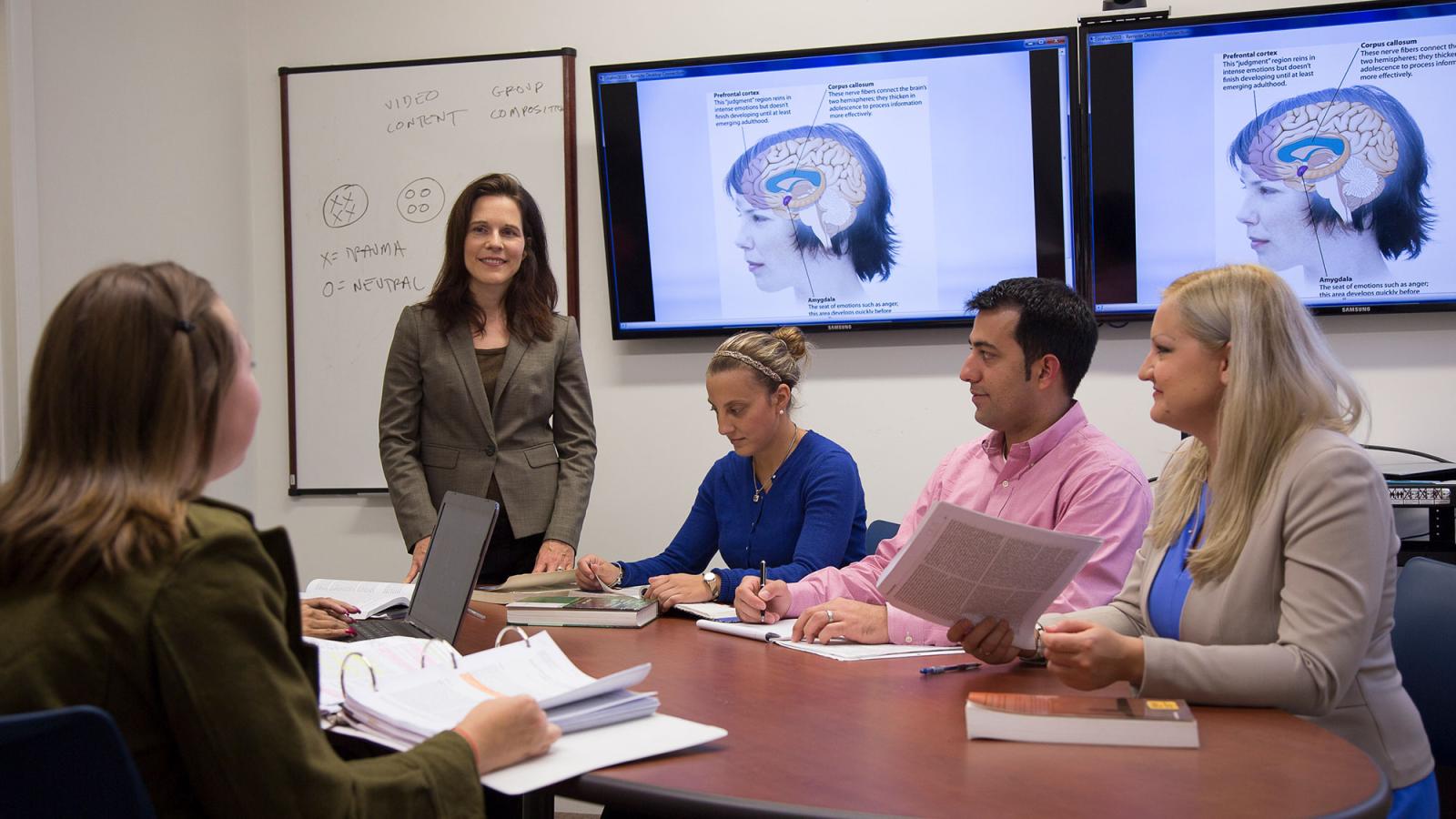

Choosing between a career in counseling or psychology can be challenging. Both fields offer unique ways to support mental health and well-being but vary in their approaches, training, and career paths.
In this guide, we’ll break down how the education of a counselor and psychologist differs and explore the options for a master’s in counseling vs. psychology—covering key skills, licensure, and career outlook—to help you find the path that aligns with your goals. Read on to discover which career is the right fit for you.
Counseling vs. Psychology: Quick Overview
Counselors and psychologists apply different skills and approaches to support mental health and personal growth. While both roles are dedicated to helping people, their methods and areas of focus set them apart.
What is a Counselor?
Counselors assess client problems and provide counseling and psychotherapy to assist with a variety of issues that clients may face including
- Mental health concerns such as depression, anxiety, and substance abuse
- Developmental challenges
- Relationship problems
Essential skills for counselors include empathy, active listening, problem-solving, and effective communication.
What is a Psychologist?
Psychologists take a more diagnostic approach, assessing mental health conditions through testing and analysis to create treatment plans. They often work with complex, long-term mental health issues, applying analytical skills, diagnostic expertise, and a deep understanding of mental processes.
Education Requirements: Master’s in Counseling vs. Psychology
While both counseling and psychology degrees prepare students to work in mental health, they differ in training and approaches. Counselors are licensed at the master’s level. Psychology degrees, on the other hand, are more research-oriented and often require doctoral study, preparing students for in-depth diagnostics, research, and long-term treatment planning.
Here’s a look at some of the common degree programs at the master's and doctoral levels, including specific examples and requirements.
Counseling Degree Programs
Counseling programs, such as the Master’s in Mental Health Counseling at Pace University, prepare students to work directly with clients in settings such as schools, hospitals, and private practices. Here’s what you can expect:
- Mental Health Counseling, MS
- Admission requirements: A bachelor’s degree in psychology or a closely related field is typically required, along with a personal statement, letters of recommendation, and potentially an interview.
- Program length: This 60-credit program is generally completed in two to three years.
- Core topics and curriculum: Courses cover cognitive-behavioral, existential-humanistic, and developmental counseling approaches, with examples including MHC 658 Group Dynamics, MHC 687 Foundations of Mental Health Counseling, and MHC 694 Practicum in Mental Health Counseling.
- Internship or observation requirements: Students complete 700 hours of supervised practicum and internships at clinical sites.
- Core competencies developed: Graduates develop hands-on counseling skills, ethical decision-making practices, multicultural competency, and therapeutic techniques.
Psychology Degree Programs
Psychology programs, such as the MA in Psychology, MSEd in School Psychology, PhD in School Psychology, and PsyD in School-Clinical Child Psychology at Pace University, often take an evidence-based approach incorporating research and practice. These programs prepare students for advanced diagnostic work, research, and treatment planning.
- Psychology, MA
- Admission requirements: Applicants typically need a bachelor’s degree in psychology or another field. A personal statement, letters of recommendation, and curriculum vitae are required. GRE scores are not required.
- Program length: This program typically takes two years to complete.
- Core topics and curriculum: The curriculum includes a wide variety of required courses (e.g., research design and statistics, developmental psychology, neuropsychology, and cognitive psychology), and elective courses (e.g., ethics in psychology, human learning, mentored lab, and master’ thesis). Courses may include PSY 604 Developmental Psychology, PSY 612 Neuropsychology, PSY 615 Research and Design Statistics.
- Internship or observation requirements: Students engage in research activities and gain practical research experience through labs and projects.
- Core competencies developed: The program emphasizes research skills, analytical abilities, and a broad understanding of the foundational areas in psychology.
- School Psychology, MSEd
- Admission requirements: Applicants need a bachelor’s degree in psychology, education or a related field. Some programs may also require work experience in a child-focused setting.
- Program length: This is a 69-credit program, generally completed in three years.
- Core topics and curriculum: The program focuses on assessment, consultation, and intervention services for children and adolescents within school settings. Example courses include PSY703 Psychological Assessment, PSY 704 Advanced Developmental Psychology, PSY 727 Learning Disabilities-Diagnosis/Remediation, and PSY 737 Child and Adolescent Psychotherapy.
- Internship or observation requirements: The program culminates in a school psychology internship within a New York metropolitan area school district.
- Core competencies developed: Graduates gain skills in behavioral assessment, psychoeducational evaluation, and intervention planning.
- School Psychology, PhD
- Admission requirements: Applicants need a bachelor’s and master’s degree in psychology, education or a related field, research experience, a personal statement, and recommendation letters.
- Program length: This program is generally completed in five to seven years, including dissertation work.
- Core topics and curriculum: Advanced courses cover assessment, intervention, consultation, and program evaluation, and research related to school-age children. Examples include PSY701 Doctoral Mentored Lab, PSY715 Statistics and Research Design, PSY 721 Tests and Measurement, PSY 727 Learning Disabilities-Diagnosis/Remediation, and PSY 734 Consultation.
- Internship or observation requirements: The program includes supervised practical experiences prior to a full-time one year internship, practicum, and four years of research training culminating in the completion of a dissertation.
- Core competencies developed: Students develop competencies in research methods; prevention, assessment, and intervention related to educational/community settings, cognitive-behavioral interventions, and program development.
- School-Clinical Child Psychology, PsyD
- Admission requirements: Applicants need a bachelor’s or master’s degree in psychology or a related field, an interview, and a strong academic background.
- Program length: This program typically takes five to six years to complete.
- Core topics and curriculum: The curriculum covers childhood psychopathology, psychological assessments, intervention techniques, psychodynamic therapy, and cognitive-behavioral therapy. Courses include PSY 710 Psychopathology in Childhood and Adolescence, PSY 711 Intervention Techniques I: Psychodynamic Perspectives, and PSY 722 Intervention Techniques II: Cognitive Behavioral Perspectives.
- Internship or observation requirements: Students complete three years of supervised clinical practicum, two years of school field experience, one year of clinical externship and a culminating yearlong internship.
- Core competencies developed: Graduates gain skills in clinical practice, diagnostic evaluation, psychotherapeutic interventions, and evidence-based psychological services.
Required Licenses
Licensure is essential for professionals in counseling and psychology, ensuring that they meet the necessary standards to practice independently and provide safe, ethical care. Here’s an overview of the licensure process for each field, including required exams, costs, and timelines.
Licensure for Counselors
To become a licensed counselor, graduates of counseling programs typically need to pass one of two national exams:
- National Counselor Examination (NCE): Offered by the National Board for Certified Counselors (NBCC), the NCE is widely accepted for licensure and assesses counseling knowledge and skills. The exam fee is $275. New York State does not accept the NCE for licensure.
- National Clinical Mental Health Counseling Examination (NCMHCE): This exam is also offered by the NBCC and is often taken by those who specialize in clinical mental health counseling. It emphasizes diagnostic and treatment planning skills and also has a fee of $275. Applicants for licensure in New York must take the NCMHCE.
After passing an exam, aspiring counselors must complete post-graduate supervised experience hours, which can take two to four years depending on state requirements. Licensure timelines and additional requirements vary by state, but most require a specific number of supervised clinical hours and continuing education to maintain licensure.
Licensure for Psychologists
The credential for becoming a School Psychologist working in public school settings is referred to as School Psychology Certification. Students obtaining a MSEd in School Psychology are eligible to apply for Certification as a School Psychologist.
The path to becoming a licensed psychologist generally requires a doctoral degree and passing the Examination for Professional Practice in Psychology (EPPP). This exam, administered by the Association of State and Provincial Psychology Boards (ASPPB), assesses the foundational knowledge and skills needed for professional psychology practice. The EPPP exam fee is $600, with additional state fees in some cases.
To meet licensure requirements, psychologists must also complete supervised postdoctoral experience hours, often requiring between 1,500–2,000 hours depending on state regulations. Due to these requirements, licensure can take four to seven years post-degree. Licensure requirements vary by state and may also depend on a psychologist’s specialization, with some states requiring additional exams or coursework in specific areas.
Career Outlook
The demand for both counselors and psychologists is on the rise, driven by increased awareness of mental health issues and the need for specialized support across a range of environments. Here’s an overview of job prospects, salary expectations, and potential work settings for each field.
Counselors
The career outlook for counselors, especially in areas like substance abuse, behavioral disorders, and mental health counseling, is very strong. According to the U.S. Bureau of Labor Statistics, employment for these counselors is projected to grow by 19 percent from 2023 to 2033, which is much faster than the average for all occupations. This growth is expected to add around 84,500 new jobs by 2033.
In 2023, counselors in these areas earned a median annual salary of $53,710 while working in various environments, including mental health centers, community health centers, private practices, schools, and hospitals. Many counselors work full-time, though part-time and flexible hours are also common, especially in private practice settings.
Psychologists
Psychologists can expect solid job growth and a higher-than-average median salary, especially in clinical, counseling, and school psychology roles. Employment for psychologists is projected to grow by seven percent from 2023 to 2033, which is faster than the average across all professions, with an estimated increase of 14,000 jobs over this period.
In 2023, the median annual salary for psychologists was $92,740 while working in diverse settings, including private practices, schools, hospitals, and research institutions. Many psychologists work full-time, with some accommodating clients by offering evening or weekend appointments.
Scopes of Practice
Whether it’s guiding someone through career choices or helping families find balance, counselors and psychologists bring specialized skills to diverse challenges. Here’s a closer look at the scopes of practice and potential specializations within each field, along with insights into typical salary ranges for those practicing in New York City.
Counselors
Counselors assist individuals in overcoming personal, social, and psychological challenges. Specializations within counseling include:
- Addiction counseling: Focuses on treating substance abuse and addictive behaviors. The average salary for an Addiction Counselor is approximately $75,943 per year.
- Career counseling: Helps clients with career planning and development. The average salary for a Career Counselor is around $75,584 per year.
- Mental health counseling: Provides general support for mental health issues. The average salary for a master’s level Mental Health Counselor is about $86,129 per year.
- Family and marriage counseling: Works with couples and families to address relational issues. The average salary for a Marriage and Family Counselor is approximately $87,810 per year.
- Rehabilitation counseling: Assists clients with disabilities to achieve personal and professional goals. The average salary for a Rehabilitation Counselor is around $74,797 per year.
Psychologists
Psychologists study cognitive, emotional, and social processes and behaviors. Specializations within psychology include:
- Clinical psychology: Involves diagnosing and treating mental illnesses. The average salary for a Clinical Psychologist is approximately $145,207 per year.
- School psychology: Involves conducting psychoeducational assessments, implementing interventions, and consultation with school-based settings. The average salary for a Certified School Psychologist in New York City is $117,912 per year.
- Educational psychology: Focuses on learning processes and educational environments. The average salary for an Educational Psychologist is about $101,361 per year.
- Forensic psychology: Applies psychological principles within the legal system. The average salary for a Forensic Psychologist is around $134,197 per year.
- Health psychology: Studies how psychological factors affect health and illness. The average salary for a Health Psychologist is approximately $144,979 per year.
- Industrial-organizational psychology: Examines workplace behavior to improve productivity and employee well-being. The average salary for an Industrial/Organizational Psychologist is about $113,188 per year.
These specializations not only reflect the diversity within counseling and psychology but also allow professionals to tailor their careers to their passions and strengths. By choosing a focused path, counselors and psychologists can deepen their expertise, stay adaptable in an evolving field, and ultimately make a lasting difference where it matters most.
All salary information was sourced from Glassdoor.com in February 2025 and based on salaries of positions located in New York, NY. Salaries are subject to change.
Counseling Degree vs. Psychology Degree: Which Should You Choose?
Choosing between a counseling and a psychology degree means understanding how each field aligns with your problem-solving style, educational goals, and desired impact on others’ lives. While psychologists and counselors serve different needs, one is not "better" than the other; each brings essential skills to the mental health field, helping clients in distinct ways.
The following factors can help you determine which path best suits your aspirations.
1. Career Goals: If you’re passionate about providing direct support to clients facing personal, social, or behavioral challenges, a career in counseling might be the right fit. Counselors often work on immediate, practical issues, providing guidance and coping strategies to help clients overcome specific challenges.
On the other hand, if you’re interested in diagnosing complex mental health conditions, conducting research, or working in specialized settings like hospitals and universities, a career in psychology may align more closely with your preferences. Psychologists often engage in in-depth assessments, research, and long-term treatment planning.
2. Education and Time Commitment: The level of education required for each field is another important consideration. For those interested in counseling, a master’s degree in counseling or a related field is often sufficient for licensure. This path can typically be completed within two to three years.
Further, pursuing advanced training as a mental health counselor typically involves completing a doctoral degree, such as a PhD in mental health counseling or counselor education and supervision. This degree usually takes three to five years beyond master’s in mental health counseling and includes advanced coursework, heavy research focus and training as a counselor supervisor.
PhD in mental health counseling prepares professionals to become leaders in the field of counseling, equipping them for roles in academia as counselor educators, clinical supervision, program development, and advanced counseling practice.
Pursuing a career as a psychologist usually requires a doctoral degree, such as a PhD or PsyD, which can take five to seven years, including research and practicum experiences. This longer educational path equips psychologists for advanced diagnostic and research roles.
3. Work Preferences: Consider the types of work environments you prefer and the nature of client interactions you envision. Mental Health Counselors often work in schools, community health centers, or private practices, focusing on a range of client needs that include both short-term and ongoing counseling and psychotherapy.
Counselors with an advanced degree, such as PhD in mental health counseling, may also work in academic institutions, taking on roles such as teaching, conducting research, and training future counselors.
Psychology roles, particularly in clinical and counseling psychology, may involve long-term client relationships and are often found in hospitals, research facilities, and academic institutions. Additionally, psychologists may work with highly specialized populations or pursue research in a specific area of interest. Certified School Psychologists typically work in educational settings, while those with doctoral school psychology training can also work in academic institutions, educational agencies, research facilities, and community mental health agencies.
Achieve Your Professional Goals With Pace University
Choosing a path in counseling or psychology is a decision that shapes not only your career but also the lives you’ll impact along the way.
Whether your goal is to provide hands-on guidance as a counselor through a program like the MS in Mental Health Counseling or to dive into mental health research and diagnosis as a psychologist through the MA in Psychology, Pace University offers multiple paths to help you succeed. You can also apply directly to doctoral programs such as the PhD in School Psychology, PhD in Clinical Psychology, or PsyD in School-Clinical Psychology—no MA required.
Explore how Pace can support you on this rewarding journey and help you achieve your professional aspirations.
Harrison Bench ’27: Pioneering a Future in Environmental Law and Policy
Harrison Bench ’27 has always been a self-starter and highly motivated to make a lasting impact. He describes his professional career, thus far, as being marked by a robust passion for identifying and promoting policy solutions to the environmental challenges we face today. It was during high school that Harrison co-founded Students for Climate Action, an environmental non-profit organization. “The goal of Students for Climate Action is to connect youth with their elected officials to lobby for common-sense climate and renewable energy policy.”
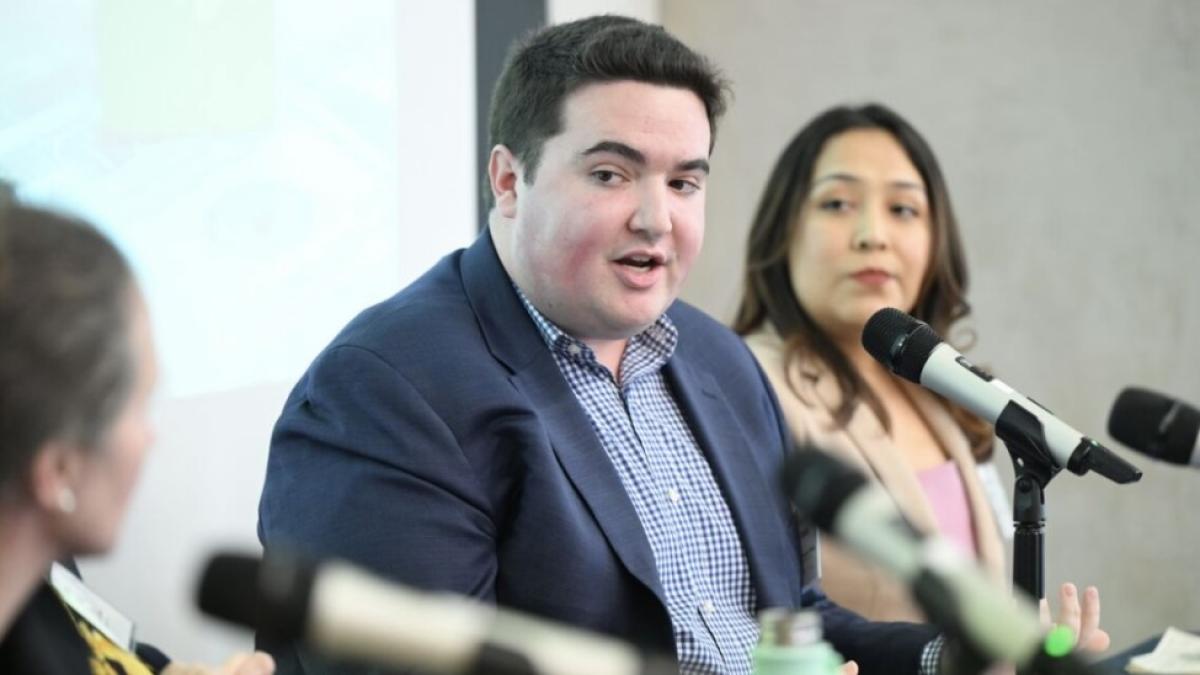
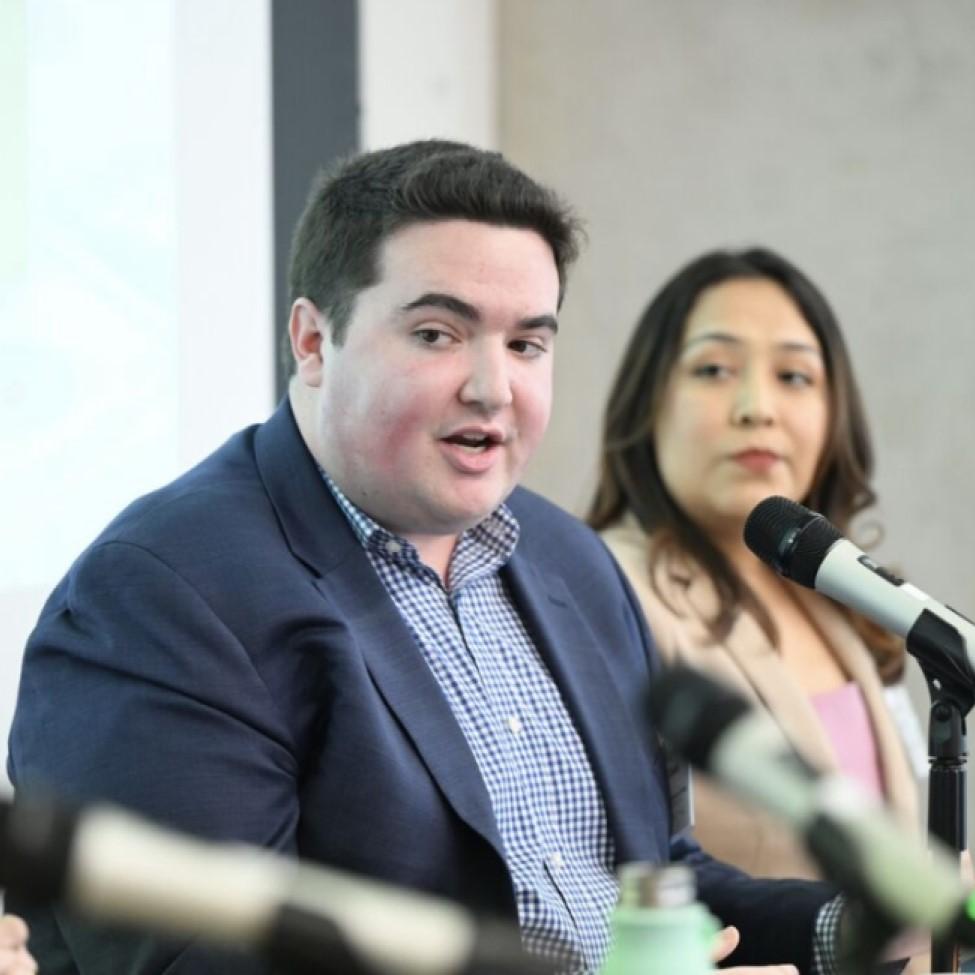
Harrison Bench ’27 has always been a self-starter and highly motivated to make a lasting impact. He describes his professional career, thus far, as being marked by a robust passion for identifying and promoting policy solutions to the environmental challenges we face today. It was during high school that Harrison co-founded Students for Climate Action, an environmental non-profit organization. “The goal of Students for Climate Action is to connect youth with their elected officials to lobby for common-sense climate and renewable energy policy.”
Harrison has had a diverse range of experiences in the private, public, and non-profit sectors. “I have worked at all levels of government, in various branches of government, and with members of both political parties to advance this mission.” These opportunities, however, taught Harrison that policy is only part of the solution. “Signing a bill into law does little if that law isn’t enforced, interpreted, and defended by a comprehensive network of attorneys in various sectors. Environmental attorneys, whether at government agencies, non-profit groups, or private firms, play a key role in the policy process.” Harrison’s varied background ultimately drove him to pursue a career in law and notably, as the first in his family to attend law school.
Once he decided to pursue law school, choosing the Elisabeth Haub School of Law at Pace University was an easy decision. “The Law School has a world-renowned environmental law program. It is close to my home on Long Island, a leader in the New York legal market, and offered a generous scholarship. I am ecstatic to be in New York and studying at the #1 environmental law program in the country.”
Harrison describes his experiences at Pace Haub Law as incredible. “While I've really enjoyed the courses I've taken so far, some of my favorite experiences have been outside of the classroom. Pace Haub Law and the Environmental Program have introduced me to countless real-world opportunities, resources, and connections. Whether it be a networking happy hour, a guest lecture, or this fall's World Conservation Congress in Abu Dhabi, I am so grateful to be at a school that prioritizes holistic and innovative approaches to legal education.”
While I've really enjoyed the courses I've taken so far, some of my favorite experiences have been outside of the classroom. Pace Haub Law and the Environmental Program have introduced me to countless real-world opportunities, resources, and connections.
—Harrison Bench '27
The faculty at Pace Haub Law have also stood out to Harrison since he started law school. “Professors Katy Kuh and Achinthi Vithanage have been incredible professors and mentors since my arrival. They’ve advised me on courses, introduced me to new organizations, connected me with job opportunities, and broadened my understanding of environmental law. I feel fortunate to have such dedicated, knowledgeable, and forward-thinking professors.” While at Pace Haub Law, Harrison is pursuing an Advanced Certificate in Environmental Law and a dual degree program with Yale School of the Environment, where he will graduate with both his JD and MEM (Master of Environmental Management).
A driven student, Harrison has taken advantage of the many learning opportunities available at Pace Haub Law. During his 1L summer, he worked at the EPA's Office of Regional Counsel (New York). Last Spring, he participated in the New York Environmental Externship, where he interned at the New York State Department of Public Service (Long Island, NY). This past summer, he worked at Paul, Weiss, Rifkind, Wharton & Garrison, LLP (New York, NY), specifically as an intern in the firm’s Sustainability Advisory Practice.
“After graduating, I'd like to work at a law firm that specializes in environmental, climate, energy, and land use law,” shared Harrison. “I am excited to apply the skills I've learned during my time at Pace Haub Law to real-world cases, transactions, and regulatory matters. Later on, I would love to end up somewhere in the policy space, either working in government service, running for elected office, or starting my own consultancy. My professors have been inspirational and because of them, I think it would be fulfilling to teach in some capacity as well.”
Very aware of the importance of networking, Harrison is also the Student Co-Chair of ABA SEER's Environmental Law Society Network (ELSN), an organization he has been affiliated with since his 1L year. ELSN connects environmental law students at schools across the country and provides them with professional development, substantive law, and social networking opportunities. It also serves as a conduit between law students and ABA SEER, the nation's preeminent environmental law association. He is also a Symposium Editor for the Pace Environmental Law Review. Recently, Harrison placed 2nd in the 2025 William R. Ginsberg Memorial Essay Contest, run by NYSBA’s Environmental and Energy Law Section. His essay, “Liar, Liar, BESS on Fire,” explores the history of battery storage, recent developments in battery energy storage system (BESS) safety, and the legality of local zoning moratoria enacted against BESS facilities.
Outside of law school, Harrison enjoys hanging out with friends and family, going to concerts, and spending time at the beach. If he could give a piece of advice to future or current law students, it would be to have the courage to say no. “As a 1L, there is a lot of pressure on students to take every opportunity that is offered to them. While it's great to get involved early on, it's important to prioritize your mental health and avoid burnout. Be selective with your time; saying no to someone else allows you to say yes to yourself! The right opportunities will find their way to you, and when they do, you will feel confident accepting them.”
Press Release: Tech Exec to Students: Critical Thinking Essential in Era of Artificial Intelligence
A leading technology executive told Pace University students that curiosity, critical thinking, and drive are essential skills in thriving in the era of artificial intelligence and evolving technologies.
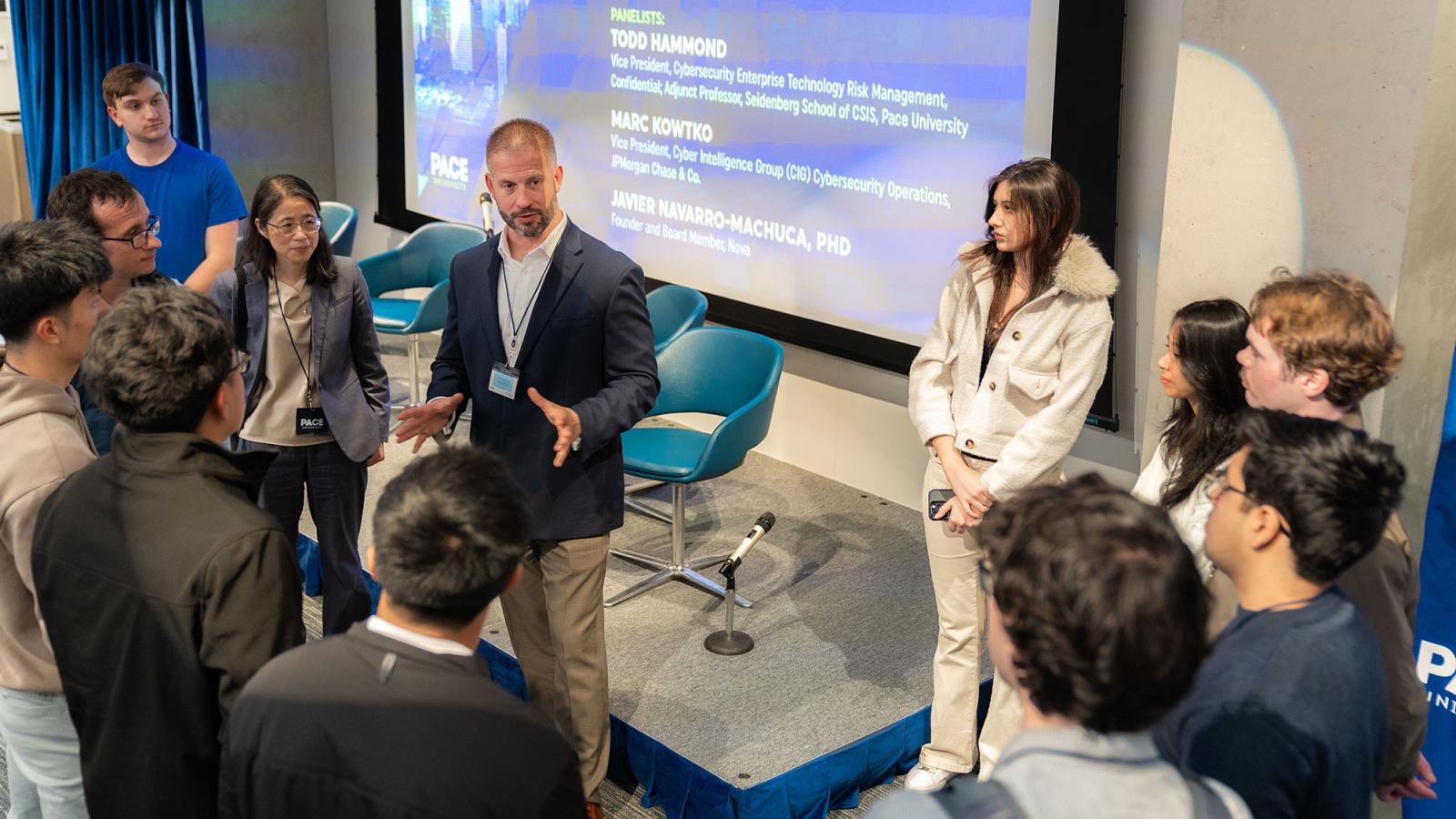
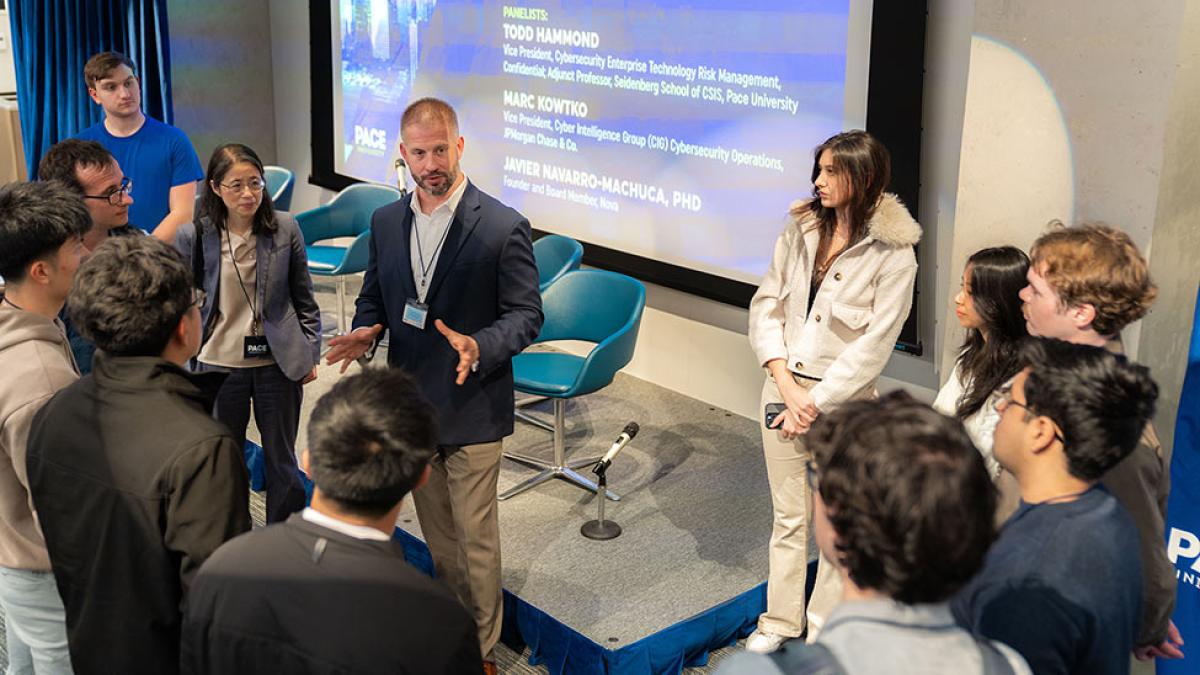
Pace University hosts its second annual fintech conference exploring AI, tokenization, cybersecurity, and the future of hiring in financial services
A leading technology executive told Pace University students that curiosity, critical thinking, and drive are essential skills in thriving in the era of artificial intelligence and evolving technologies.
In speaking before hundreds of students, faculty, alumni, and industry professionals at Pace University in Lower Manhattan for the second annual Pace of Fintech: Accelerating Innovation Conference, Matthew Papas, chief data officer at Sixth Street, gave students of all majors and interests sage advice.
“You’re never going to know everything walking in the door — the most important skill is being able to figure things out,” said Papas. “The best people I’ve hired aren’t necessarily computer science or finance majors. I’ve seen musicians and liberal arts grads thrive because they understand how data, technology, and business connect. If you’re curious and willing to experiment, you can learn almost anything. The tools are all out there — it’s about having the drive to use them.”
The event, a collaboration between Pace University and global investment firm Sixth Street, explored how artificial intelligence, tokenization, and cybersecurity are reshaping the financial services landscape and the future of work. A keynote fireside chat and expert panel sessions offered students real-world insights and a front-row seat to the forces transforming the fintech landscape.
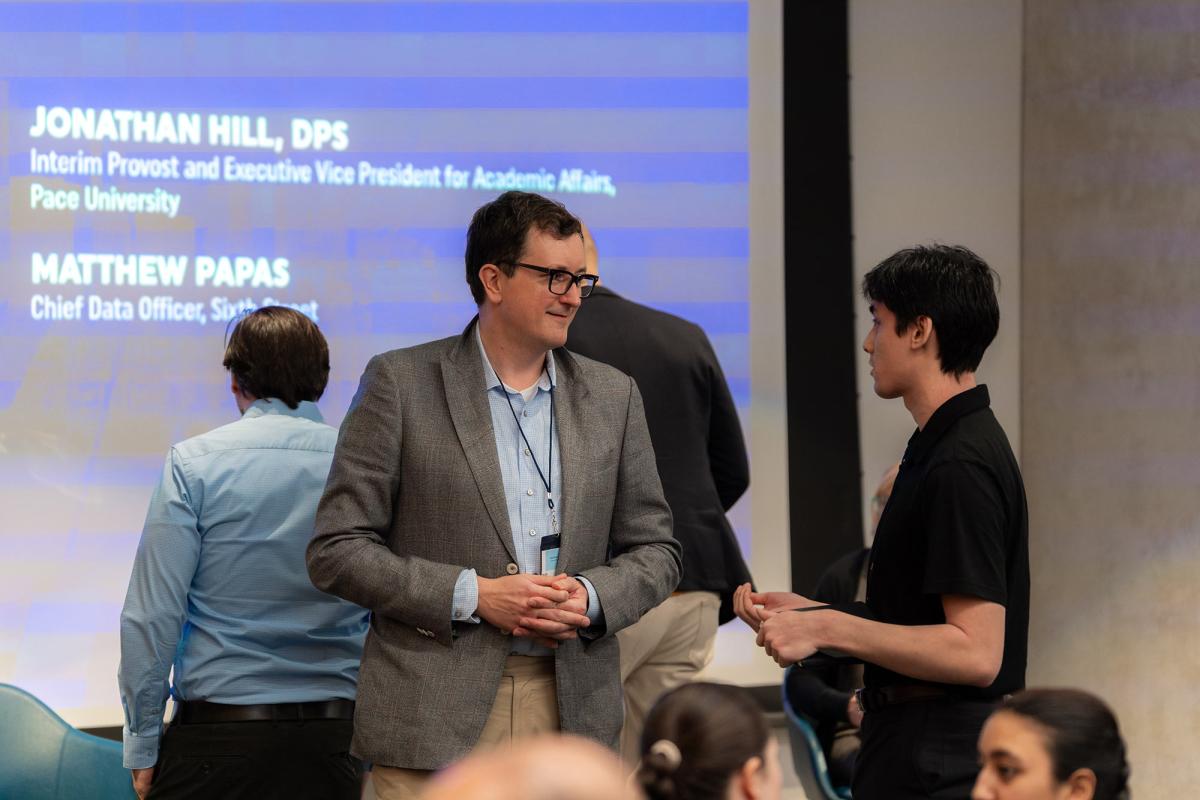
The program opened with a thought-provoking fireside chat between Jonathan Hill, DPS, interim provost and executive vice president for academic affairs at Pace, and Papas, Sixth Street’s chief data officer. Their discussion examined the explosive growth of data in financial decision-making and set the tone for an afternoon of bold ideas and future-focused dialogue.
“This conference is a testament to the power of collaboration between academia and industry to drive innovation,” said Hill. “By bringing together experts and emerging leaders in fintech, we’re not only exploring the technologies transforming global finance—we’re preparing our students to shape that future.”
The event built on the momentum of Pace’s inaugural Actionable AI Conference in Pleasantville, further underscoring the University’s leadership at the intersection of artificial intelligence, education, and industry innovation.
Among the featured sessions were three panel discussions that explored emerging challenges and opportunities in the fintech space:
The first panel, “Tokenization and Its Implications for Financial Markets,” sponsored by the Lubin School of Business, was moderated by finance professor Iuliana Ismailescu. The session explored how blockchain, tokenization, and digital assets are reshaping traditional financial systems and accelerating the shift toward a decentralized future. Panelists included Piotr Marciszweki, commercialization lead for digital assets and Carlos Vivas, head of engineering for Citi’s Digital Assets Platform, as well as Janet Wynn, adjunct professor of finance at Lubin. Together, they addressed the regulatory, technical, and institutional challenges that come with this transformation.
Shifting from technology to talent, the next discussion, “Hiring Great Talent in the FinTech Industry,” offered students an inside look at what today’s fintech employers are really looking for. Kate Smith, HR business partner and Whitney Hannallah, investment engineering analyst — both of Sixth Street — joined Phyllis Mooney, assistant vice president of Career Services and Employer Relations at Pace, to share insights on preparing for the industry’s evolving demands. From adapting to market trends to building cross-functional skills, panelists emphasized that success in fintech depends as much on curiosity and adaptability as it does on technical knowledge.
“Even the biggest financial firms have long understood that technology isn’t just there to support the business — it’s what drives it forward,” said Smith, of Sixth Street. “That’s why curiosity and adaptability matter so much. We don’t expect you to know everything, but we want to see that you’re a sponge — that you ask questions, stay curious, and find ways to grow. That mindset is a gift, and it’s one of the most valuable traits any team looks for.”
To close out the conference, “Cybersecurity Threats to Financial Services: From Infrastructure to AI,” tackled one of the most pressing concerns facing the industry today. Led by Li-Chiou Chen, interim dean and professor at the Seidenberg School, the panel brought together cybersecurity leaders including Todd Hammond, vice president of cybersecurity enterprise technology risk management and adjunct professor at Pace, Marc Kowtko of JPMorgan Chase, and Javier Navarro-Machuca, PhD, founder and board member of Nova. The session explored how financial institutions are adapting to an increasingly complex threat landscape, from foundational infrastructure risks to the far-reaching implications of generative AI.
“AI isn’t a career ender—it’s a game changer,” said Hammond. “We’ll learn to work alongside it, master it, and use it to amplify what only humans can bring: our ethics, our morals, and our creativity.”
A networking reception followed the panels, offering students and guests the opportunity to connect with speakers, recruiters, and faculty. As part of its broader commitment to innovation and workforce readiness, Pace also announced the launch of a new Bachelor of Science in Artificial Intelligence, beginning in fall 2026. Offered through the Seidenberg School, the new program complements existing master’s degrees in Artificial Intelligence and Applied Artificial Intelligence and reflects Pace’s ongoing commitment to equipping students with practical skills and a strong understanding of how emerging technologies are transforming the world.
“Fintech is transforming the world, and at Pace University, we have been preparing our students to lead that transformation,” said Pace President Marvin Krislov. “This conference reflected what Pace does best, bringing together industry and academia to turn ideas into action. Our continued partnership with Sixth Street gave students, faculty, and professionals the chance to learn from one another, share insights, and explore the technologies that are driving the future of finance.”
About Pace University
Since 1906, Pace University has been transforming the lives of its diverse students—academically, professionally, and socioeconomically. With campuses in New York City and Westchester County, Pace offers bachelor, master, and doctoral degree programs to 13,600 students in its College of Health Professions, Dyson College of Arts and Sciences, Elisabeth Haub School of Law, Lubin School of Business, Sands College of Performing Arts, School of Education, and Seidenberg School of Computer Science and Information Systems.
About the Lubin School of Business at Pace University
Globally recognized and prestigiously accredited, the Lubin School of Business integrates New York City’s business world into the experienced-based education of its students at Pace’s suburban and downtown campuses, implemented by one of the region’s largest co-op programs, team-based learning, and customized career guidance. Its programs are designed to launch success-oriented graduates toward upwardly mobile careers.
About the Seidenberg School of Computer Science and Information Systems at Pace University
The Seidenberg School of Computer Science and Information Systems at Pace University is a leading institute of technology education. Students experience a dynamic and expansive technology education at the undergraduate and graduate levels. One of the first comprehensive schools of computing in the nation, the Seidenberg School is strategically located in the heart of NYC’s tech scene, right on the doorstep of New York’s most promising companies. With access to established tech giants and exciting new start-ups from both the New York City and the Westchester campus, Seidenberg offers the opportunity to connect, intern with, and enjoy lucrative tech jobs following graduation. Through partnerships with leading tech firms, banks, federal agencies, and global institutions, the school’s curricula and programs are designed to ground students in the fundamentals while offering numerous hands-on experiential learning opportunity. The faculty includes numerous experts in artificial intelligence, cybersecurity, data science, game development, software engineering, and much more, who operate labs and centers providing students with practical experience and connections that lead to impressive internships and jobs.
About Sixth Street
Sixth Street is a global investment firm with over $75 billion in assets under management and committed capital. Sixth Street uses its long-term flexible capital, data-enabled capabilities, and One Team culture to develop themes and offer solutions to companies across all stages of growth. Founded in 2009, Sixth Street has more than 600 team members including over 250 investment professionals operating around the world.
The Racism And Islamophobia Behind Many Of The Attacks On Zohran Mamdani
In The Guardian, Pace University Professor Laura Tamman examined the racism and Islamophobia fueling attacks against New York City mayoral candidate Zohran Mamdani, praising his “impressive composure under pressure.” Her analysis shed light on the broader social and political forces shaping the city’s high-stakes race.
What Students Study Matters. How Colleges Guide Them Matters More.
Pace President Marvin Krislov writes a piece in Forbes about the crucial role universities play in guiding students—especially first-generation college-goers—from the classroom to career success. He emphasizes that while ambition and curiosity abound, many students “lack a map,” and it’s the institution’s responsibility to help them build one through advising, mentorship, and hands-on learning.
